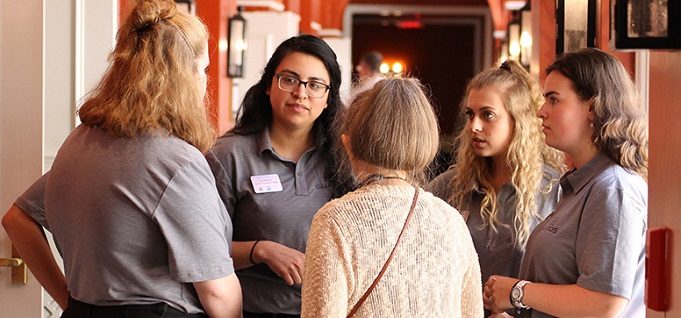The Community College Innovation Challenge returns
By Madeline Patton
February 24, 2021
Submissions are due April 20
The Community College Innovation Challenge (CCIC) is looking for ideas to address real-world problems.
The national program is designed to enable community college students to discover and demonstrate their capacity to use science, technology, engineering and mathematics (STEM) to make a difference in the world.
“At a time when the world needs inventive thinking as never before, the American Association of Community Colleges (AACC) is delighted to offer this student competition in partnership with the National Science Foundation. We are excited to see students’ breakthrough ideas to address problems — from local to global concerns the students select — and to provide tools that transform those ideas into society-benefitting innovations,” said Ellen Hause, AACC’s program director for academic and student affairs.
Projects that previously won top CCIC awards include:
- An aquaponic system that cultivates fish and plants to combat hunger.
- A heat recovering silencer to reduce auto noise pollution and address climate issues.
- Tailor-made viruses to combat the spread of antibiotic-resistant bacteria.
- A cyberlab learning environment to help students develop real-world cyberskills in a safe and student-created environment.
To participate in this year’s virtual competition, community college students — working in teams of two-to-four students with a faculty or administrator mentor — must submit their STEM-based solutions by April 20.
Discovery and demonstration of skills
CCIC also provides a way to strengthen and further develop students’ entrepreneurial and strategic communication skills to teach them how to take STEM-based ideas out of the classroom, lab or workshop and into the marketplace.
Up to 10 selected finalist teams will compete in a virtual innovation boot camp June 14-17. At this professional development workshop, students will receive coaching, mentoring and instruction to help them refine their ideas in advance of a virtual poster session and a pitch presentation.
The instructional sessions will cover entrepreneurship topics, such as how to:
- commercialize ideas
- use social media to promote and brand innovations
- communicate with stakeholders
A panel of judges will assess the finalist teams’ representations of their innovations during the virtual poster session and evaluate the merits, value and potential viability of the ideas during the pitch presentations.
Each member of the top teams will receive monetary awards: First place team members will each receive $3,000; second place $2,000; and third place $1,000.
The competition, which was last held in 2018, has been re-conceptualized due to Covid-related limitations on in-person gatherings.
Advice from entrepreneurs
The new CCIC format retains the most dynamic aspect of previous competitions — the boot camp, where finalist teams receive guidance, training and resources on how to implement innovative ideas from entrepreneurs and business development professionals. Finalists will also have the opportunity to interact with an audience of STEM and congressional stakeholders during the virtual poster session.
The virtual format offers a unique opportunity for students because it allows for elite industry leaders and entrepreneurs to talk with them during boot camp sessions without having to travel to Washington, D.C., where CCIC was previously held. Teams will discuss business planning, stakeholder engagement, communication and marketplace dynamics. The aim is to sharpen students’ business acumen and give them skills that they can apply to other projects.
The design of the friendly competition also encourages the student innovators to connect with people on other teams by sharing ideas and learning from each other as well as from the experts.
Prepare ASAP
Students enrolled in two-year degree programs and their faculty or administrator mentors are encouraged to meet soon to begin work on identifying the problem they want to address; assessing their innovation’s potential impact; determining the scientific and market feasibility of their idea; and developing the steps to make it happen. Teams are not required to have already implemented their proposed innovations.
Students seeking feedback on their ideas before submitting an application can attend a virtual CCIC session on March 18 to ask questions and informally pitch their ideas and receive feedback from a previous CCIC judge, a former student participant, and representatives from AACC and the National Association for Community College Entrepreneurship, which is a collaborator on CCIC.
To enter the competition, teams must register at www.aaccinnovationchallenge.com and submit a written entry and video entry by 11:59 p.m. on April 20.
The written entry must describe the problem, the team’s solution and how implementation of the solution will impact things such as the quality of life, national security, U.S. global competitiveness or educational opportunities.
In the 90-second video entry, student team members must articulate the problem in nontechnical language and in a compelling way describe how the team’s solution is innovative and unique. The video should include information on methods of implementation and insights beyond the written entry.
The finalists will be announced in early May. Members of those teams must then attend two webinars about the boot camp and STEM innovation on May 7 and 11, respectively. From May 11 to June 13, the teams will engage with potential customers to gather information that they will use at the boot camp.
There’s more to the story! Read students’ reflections in CC Daily.



